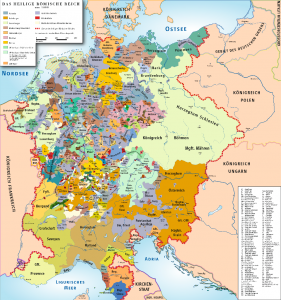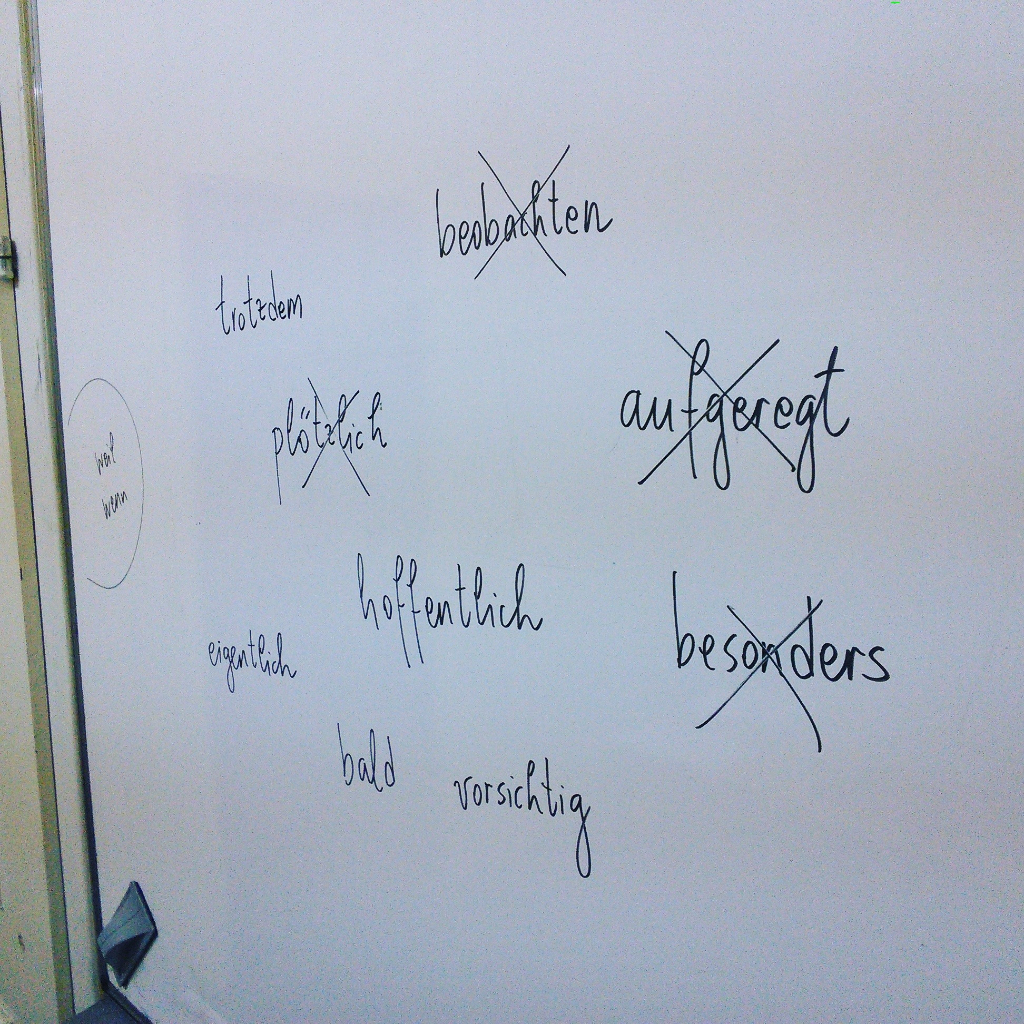Teaching foreign language in a class with more than 28 students is a challenge of a kind. However, if you are teaching older teenagers (15-19 years old) German as a second foreign language in a state high school – it could become a nightmare. Of course they are always tired and don’t want to participate. There are scientific explanations for that (read more about it here). However, you may find yourself in a class where students who should be at least at the A2 level cannot build Present time correctly. If you happen to be that “lucky” teacher, you will have to do anything to keep the class rolling and you will invest many hours thinking of some ways to draw the students’ attention. This post is handling topics and games which could be used in classes with older teenagers in public schools.
Topics
1. Similarities between German and English
Since both languages belong to the group of German languages, you can always pick up this topic and go through it in your class. You can teach your teenagers many German words only due to the fact that they sound similar in English.
You could start with easier words like ‘Vater, Bruder, Tausend’ and continue with little more difficult words like ‘Freund, helfen, besser’ and then go through the least easy ones like ‘Apfel, Ding, Buch, Herz’. You can write these words on the white board and have the students guess which English words are their pairs. You can provide solutions if you wish and tell the students to join the words in lists. Of course, at some point you can explain to them that similarities between those words are based on specific consonant changes. More examples and everything about these consonant changes can be found here.
2. English-German false friends
German is full of words which sound similar to some English words, but mean something totally different. For example, ‘wer?’ means ‘who’ and not ‘where’; ‘Gift’ means ‘poison’ and not ‘gift’; ‘bekommen’ means ‘to get’ and not ‘to become’.
More examples can be found here.
3. German castles
Students want to find out more about the land and people. Since German castles can be an attractive travel destination, your students are going to love this topic. Of course, you should work with pictures and videos if possible. you can explain to them that Germany was divided in numerous principalities which is why there are so many castles in Germany. More material can be found here. You can even show the students a comedy about the fairy-tail-king Ludwig II (Lissi und der wilde Kaiser).

4. LORELAY AND THE RHINE
If your students don’t know how to even read in German, you have to find a simple text which would be interesting and easy enough for them. The poem ‘Loreley’ seems to be very convenient. It tells an interesting story about a girl and it is short. This is a well known legend and you can discuss that too with your students. At some point you realise that Lorelay is placed in the Rhine valley which is a very pretty part of Germany and became part of the UNESCO world heritage. You can show students some videos too. More about this topis can be found here.
5. German inventions
There are so many of them and they can provide a good impulse for learning of numerous German words. This topic is going to intrigue your students – they will find 101 reason why you are wrong when you claim that the Germans invented telephone, computer or beer. However, you will still be able to work on their vocabulary with these words. Who want to dispute can prepare a presentation and prove that the German Ministry of Foreign Affairs is wrong.
Detailed information along wit a card game can be found here.

6. German Nobel Prize winners
Believe it or not, Germany has 78 Nobel prize winners. Not 16, not 36, but 78. You can use this information as an item for a quiz. For more information click here.
7. German brands
You can share with your students interesting stories about the history of some German brands like Audi or Adidas. It will definitely be very interesting for them to find out what the word “Audi” means and how the Audi sign came into being. About the history of Audi read here (including a video in German).

8. the longest German word
“Fußbodenschleifmaschinenverleih” (31 letters, meaning: shop that lends floor sanding machines) is not the longest word in German. Find out what is the longest word in German and compare that to your mother tongue. Your students can help you. This information can be used for a quiz.

9. Humor
Your students are going to love jokes about Chuck Norris or ‘regular’ jokes about, for example, Italian guys who still live with their mothers. You could also use jokes when teaching grammar, like, for example, Wechselpräpositionen: Ein Schornsteinfeger kommt in die Bar. Der Barkeeper sagt zu ihm: Der geht aufs Haus.
10. Funny photos
You can find numerous funny pics on Facebook or Instagram and use them to start your classes. Teenagers love visual materials and this will definitely draw their attention. You could ask them to describe what they see, to try to translate, to try to imagine what they would say in the same situation. Find some pics to start with here.

11. Swearwords
This topic might be inappropriate, however it will abruptly make German “cool” among your teenagers. Remember, you don’t have to translate the swearwords into your mother tongue, use translations in English instead. List of German (censored) swearwords can be found here. In addition, there is a German film which is full of swearwords and which is fantastic. Consider watching it with your students: Fack ju Göhte.

12. German pop music
Since teenagers bother deep emotions and daily problems with adults and their peers, pop-songs which speak about these topics are always welcome. I would recommend these bands: Deine Freunde and AnnenMayKantereit along with Clueso. Clueso who was a culture ambassador on behalf of Goethe Institut), while Deine Freunde make make hip-hop music for younger teenagers.
13. 10 useful phrases
If you run put of interesting topics, you may consider teaching your students some 10 useful sentences that they could use in everyday life during their stay in Germany. For example, you could teach them how to say “I’ll get the beer” – which they will need if they visit Oktober-Fest.
14. Tests from magazines
If you get your students interesting tests from real German magazines which you bought lately, they will be delighted. For example, there is a test at the begining of every issue of my favourite magazine “Neon” (for example: “bin ich verliebt?”). In addition, there is a photo riddle at the end of each issue – people should guess what particular pictures represents (for example a music instrument, occupation etc.). Click here in order to see how this looks like.

15. Digital media
Not all teenagers have tablets, but they all use their iPones and other Android telephones on a daily basis. You could take advantage of this and organise an interesting project for your students. They could test various free applications for learning foreign languages like Deutsch-Trainer A1, WordPic, Memrise, Deutsch-Akademie, Busuu, Duolingo, Learn Deutsch. You could divide them in groups and have them test the layout, describe the app, say which operating systems does it support, can it be applied in classes and give one final evaluation. They could give points from 1 to 10 for each category they are evaluating. That will give them the feeling that they are important and make them take the responsibility.
16. Recommended textbooks
There are so many textbooks for teenagers. I would recommend Deutsch.com (Hueber) for older teenagers (15-19), while Beste Freunde (Hueber) appears to be appropriate for younger teenagers (9-15) because it includes also a DVD.

Games
1. Quiz in groups
Anything that you have gone through with your students can be “tested” in a form of a quiz in groups. You can divide the whole class in just two groups and ask them questions with a-b-c answers provided (you may use a PPT presentation for this purpose). The students should guess which answer is correct and they should choose one representative who will talk on behalf of all of them after they decide that they are ready to say their final answer. For example, you could ask them which tongue is the most spoken language in the EU: a) English, b) German, c) French; or: which city from the German speaking area is the most convenient city for living in the world: a)Zurich, b) Munich c) Vienna. For other examples click here. And don’t forget, you can test grammar this way too.
2. Ping-pong story
using Skype, Viber or SnapChat your students could tell any story you can think of. They should work in pairs and write one sentence each in a row. They could describe how some person’s day look like or even tell the following story: “one day in the life of my iPhone”.
3. Think as many words as you can
Give the students some letters and have them think of as many words as they can. You can start with these letters: DEUTSCHLAND and continue with any other interesting words, like EUROPE etc. Click here to find solutions for these letters.
4. Cross word puzzles
Any vocabulary that you are going through can be practiced with cross word puzzles. You can create your own exercizes, including cross word puzzles by using numerous online generators.
5. write a simple poem
Some poetry in just 5 rows cannot harm. You should write the following instructions on the white board and students should complete the rows:
1. row: 1 word: chose any word that you like.
2. row: 2 words: write something that describes this word.
3. row: 3 words: what is this word, what does it do?
4. row: 4 words: start with “ich…”.
5. row: 1 word: end with one word.
Here is an example from my students (A1.1.):
Warten.
Ist lang.
Wann kommst du?
Ich komme sehr bald.
Wunderbar.
6. other useful suggestions:
6.1. At the beginning of any class, have your students gather in groups and discuss what was gone through in the last class. That way those students who weren’t there or have forgotten to do their homework will be able to catch up. The following questions could be answered:
– What have we done last time?
– what have we learned?
– what did you like most?
– what was boring?
– did you like the homework?
– miscellaneous
You could discuss with them afterwards in plenum or ask each group individually what are their foundings.
6.2. Students don’t need to express them selves only with words. They could work in groups and present their work either as a short presentation, or through a collage or a comic strip. That way they will use German, however, they will feel free to express their creativity. One important aspect here is that students which don’t prefer to speak in front of the class, will be involved and get their chance to take part in the class.
6.3. “Heißer Stuhl”
If your students feel tired you could have them play this game. One student comes in front of the class and sits on a chair with his/her back turned to the whiteboard. You should write a word on the whiteboard and the student which is sitting in front should guess which word that is. Other students are divided in 2 groups and should have one speaker who will try to describe the word on the whiteboard so that the guessing student should guess as fast as possible.
6.4. At the end of every class, the students should tell which word did they like most, and they should explain why that so is. You could also vary the task and ask them to tell which verb, adjective or phrase did they like most. Students could work in groups too. Ask them to chose one word, write it on a piece of paper and hang it somewhere in the classroom. Other students will then go around and look at other groups’ words. If they don’t know what some of them means, they could write a minus sign beside it. The meanings are to be explained afterwards.
6.5. Before you start practising listening with your students, you could write about 10 most important words which will appear in the text on pieces of paper and place those papers on tables in the classroom, on windows or on the door so that everyone can see them. Divide your students in groups (3-5 players). One player from each group should stay in the middle of the classroom and run to each word as soon as they hear it. The task is that the players get the piece of paper with that particular word back to the middle of the class room. The winner is the group which grabbed the most words. In addition, students should find the words that they have grabbed in dictionaries and explain them to the rest of the class.
For other ideas in the field (from Goethe Institute) click here.





